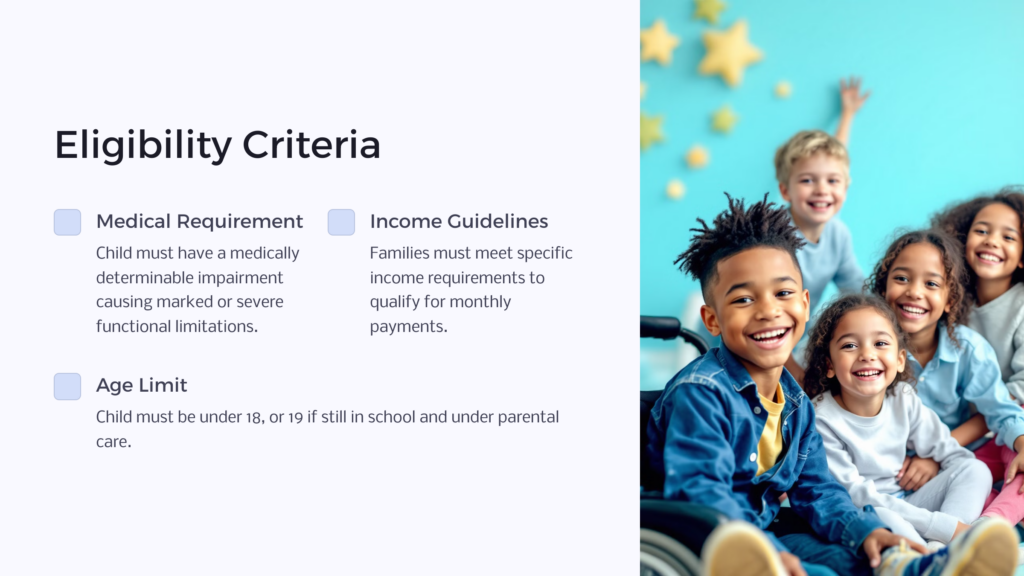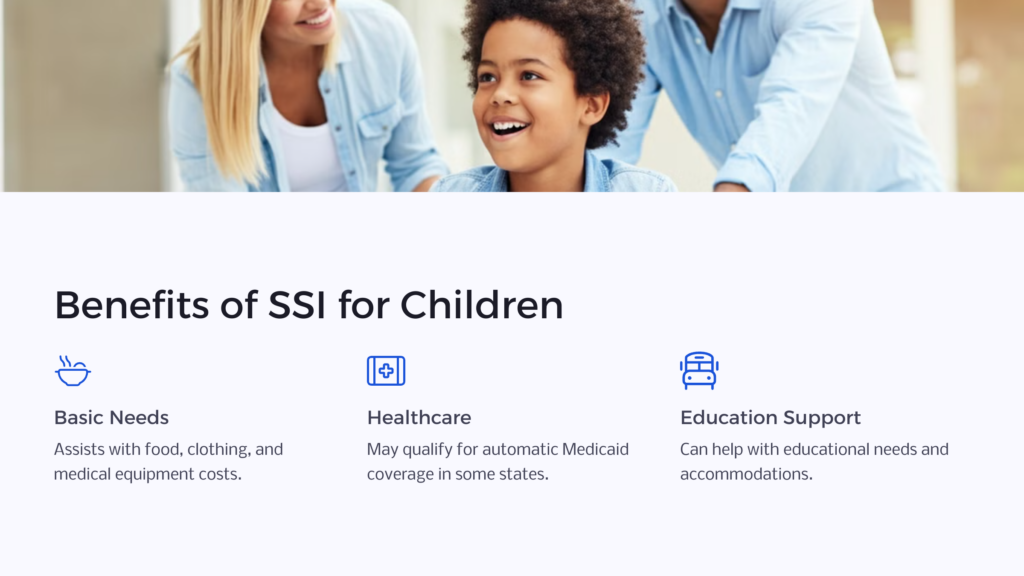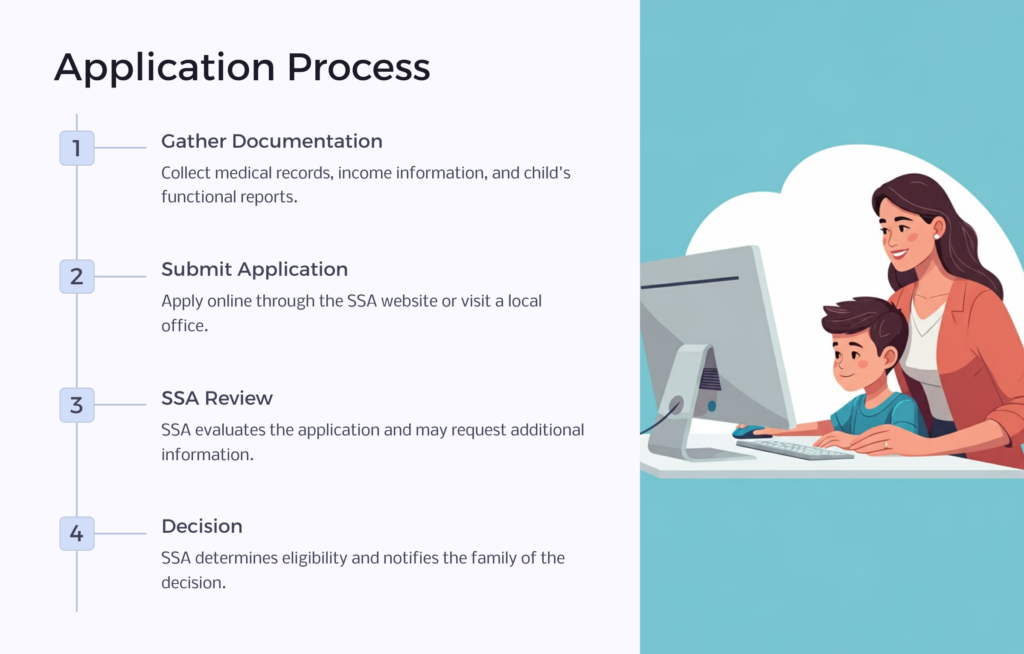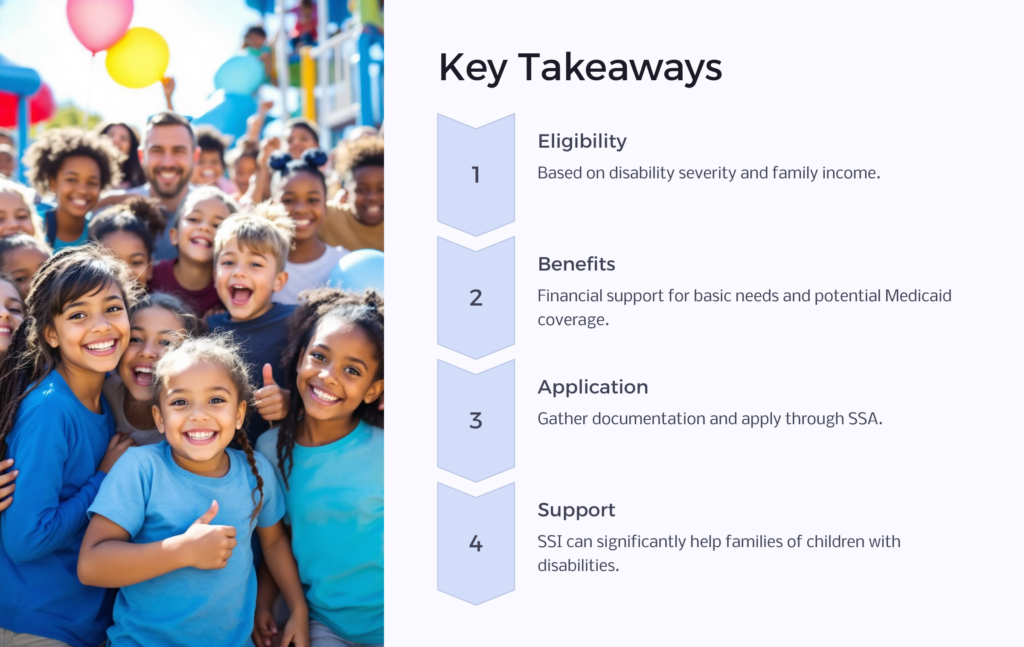
The Social Security Administration provides Supplemental Security Income (SSI) to adults and children living with specific disabilities. For children to qualify for SSI, they must have limited daily functioning as a result of their disability. Families must also meet income guidelines to be eligible for the monthly payment.
In general, your child must have a medically determinable physical or mental impairment that results in marked or severe functional limitations. Just having a medical diagnosis does not typically qualify your child for SSI benefits, you must also show that there are significant limitations as a result of the diagnosis. SSA will provide you or your child’s doctor with a function report to determine how the impairments affect your child’s daily functioning.
SSI disability benefits can assist low-income families in paying for things the child needs, such as food, clothing, and medical equipment. Children eligible for SSI may also qualify for Medicaid automatically, depending on the state in which they live. Parents receiving SSI for their children must document what they use the money for.

How Can I Get Social Security Benefits for My Disabled Child?
Parents can apply for SSI benefits for a child with special needs. The child must be under 18 years old and have a disability which causes severe limitations in the child’s functioning.
Children who are 19 years old may also receive SSI benefits if they otherwise qualify for the benefits, are still attending school through grade 12, and are under the care of their parents. Two months after the child turns 19, the child may be switched over to SSI benefits for adults. The program remains the same, but SSA could require more information about the child’s educational performance, day-to-day living, and disability before providing payments.To apply for Social Security disability benefits for a dependent child, you can visit the SSA website.

Child Disabilities That May Qualify as an Impairment
The following list of child disabilities are ones that parents can name in an SSI disability claim when applying on their child’s behalf for SSI benefits.
1. Cancer
Social Security lists malignant neoplastic diseases as ones that SSI benefits can cover. This means that children living with various forms of cancer or leukemia can qualify if they meet income guidelines and have medical evidence of their impairment.
When making a disability determination for a child with cancer, Social Security will consider the type of cancer, the duration of therapy and the child’s response to therapy, and the after-effects of therapy, if any.
2. Respiratory Disorders
Respiratory disorders, like cystic fibrosis or chronic lung disease, are coverable by SSI benefits. The SSA recognizes respiratory disorders involved in air restriction, obstruction, or diffusion. When a parent applies for a child with a respiratory disorder, the parent must provide medical evidence of lab tests, physical exams, imaging results, and prescribed treatment or medications.
Social Security will consider the severity of symptoms associated with this medical condition and the child’s response to any treatments. Your child may also have spirometry testing to gauge their lung efficiency.
3. Low Birth Weight and Failure to Thrive
Low birth weight (LBW) and failure to thrive (FTT) in infancy can indicate growth impairments. Social Security recognizes these conditions as a disability category that could lead to developmental delays in young children.
Parents or guardians may show proof of either condition using birth weight documentation from birth and medical records. Social Security determines that LBW or FTT are plausible for a child based on growth tables for the child’s age range and the child’s historic birth weight and growth.
4. Musculoskeletal Disorders
Musculoskeletal disorders are those that cause physical or orthopedic impairments. Some disorders Social Security considers in its evaluations include inflammatory arthritis, the curvature of the spine, and spinal cord injuries.
A physical examination may be necessary if there has not been enough medical evidence describing a child’s condition. Otherwise, Social Security considers the child’s medical history and a parent or guardian’s written description of the condition, its severity, and the symptoms it causes.
5. Special Senses and Speech
Children with visual or hearing disorders can receive SSI benefits under this category. Social Security considers blindness, visual disorders, loss of visual efficiency, and hearing loss with or without cochlear implantation to be potentially eligible disorders.
For statutory blindness cases, Social Security does not require documentation of the cause of blindness. However, hearing loss cases typically need documentation that proves there is a medical cause for your child’s hearing loss.
6. Hematological Disorders
Social Security makes many malignant and non-malignant hematological disorders eligible for SSI benefits for kids. These disorders can include but are not limited to bone marrow failure, thrombosis, multiple myeloma, and leukemia. Social Security relies mostly on laboratory tests ordered and signed by a physician to determine hematological disorders. Still, a written, detailed report from your child’s physician may also lead to eligibility.
7. Immune System Disorders
Social Security categorizes immune system disorders as HIV infection, autoimmune disorders, and immune deficiency disorders, excluding HIV infection. Because many variables are involved in diagnosing immune system disorders, Social Security may require different forms of proof for different cases.
In most cases of immune system disorders, parents should expect to prove a child’s health history through physical exams and diagnostic test results. Specific tests may be required, like x-rays or MRIs, depending on the child’s condition.
8. Cardiovascular System
Children born with or who have developed a heart defect or condition affecting the cardiovascular system may qualify for SSI benefits. Social Security considers any medical condition that affects how the heart and circulatory system function. It also considers heart conditions that are persistent or recurring.
Medical imaging results and detailed physician reports of your child’s condition usually provide enough medical evidence for this particular category.
9. Digestive System
Many disorders can affect the digestive system. A disabled child and their parents may seek SSI eligibility for digestive conditions like hepatic dysfunction, inflammatory bowel disease, and malnutrition.
Medical documentation for these disorders may be lengthy, depending on the condition. Some families may need to provide pathology reports, x-ray results, and radionuclide scan results. Social Security also considers the treatment your child receives, if any, and how responsive your child has been to the treatment thus far.
10. Genitourinary Disorders
Genitourinary disorders affect the kidneys and may lead to chronic kidney disease. Diabetic neuropathy, hypertensive neuropathy, and ectopic ureter are examples of genitourinary disorders that may qualify for SSI benefits.
Social Security determines the severity of genitourinary disorders through lab tests, imaging results, and physician reports. Your child’s treatments, like dialysis or transplantation, will also be evaluated in terms of efficacy.
11. Skin Disorders
On the list of child disabilities eligible for SSI benefits, skin disorders can often be among the most perplexing and difficult to prove, mostly because the severity of these conditions can vary significantly among children. Skin conditions potentially eligible for SSI include dermatitis, chronic skin infections, and burns.
Social Security considers a parent’s explanation of the severity of their child’s disorder, including how it affects their daily life. The agency also relies on medical history that details your child’s skin lesions, symptoms, and treatments. If your child lives with any condition that could adversely affect the health of the skin or cause skin disorders, Social Security may also seek more information about that condition.
12. Endocrine Disorders
Endocrine disorders, such as conditions affecting the thyroid or pituitary gland, may be eligible for SSI benefits, depending on how their symptoms affect a child’s daily life. Children younger than age six with diabetes mellitus type 1 or 2 and requiring insulin may automatically qualify for these benefits. Other conditions may require medical evidence that symptoms have not improved or have worsened over time.
13. Congenital Disorders that Affect Multiple Body Systems

Congenital disorders that affect multiple body systems is a category that incorporates conditions like non-mosaic Down syndrome, anencephaly, and Edwards’ syndrome. These are conditions that can interfere with a child’s development since birth. Social Security may require a lab report of tests that have helped diagnose a congenital disorder as well as a detailed physician statement of the diagnosis.
14. Neurological Disorders
A disorder that affect the neurological system, such as a coma or epilepsy, would be a qualifying disability for SSI benefits if it impacts a child’s physical and mental health. The SSA considers both medical and non-medical evidence to evaluate a child’s neurological condition, including imaging scans, physician reports, and written statements from a parent or guardian.
15. Mental Disorders
SSI benefits for autistic children and others experiencing mental disorders typically require a lot of documentation from parents or guardians, doctors, and specialists who work with the child. Other examples of mental conditions that may qualify include somatic symptom disorders, schizophrenia spectrum disorders, and anxiety disorders. Cognitive development, physical symptoms, and executive functioning are all evaluated by the SSA.
The list of child disabilities above includes those that may qualify a child for help under the SSI program. However, remember, typically the diagnosis alone will not qualify your child for SSI benefits. You must also show that your child’s disabilities interfere with their daily functioning, like attending school or eating. Again, SSA will provide you or your child’s doctor with a function report to determine how the impairments affect your child’s daily functioning.
Children who qualify for SSI benefits may also meet Medicaid eligibility guidelines automatically, depending on the state in which they live. Together, these benefits can assist low-income families with paying for necessities and related services for the child.
Compassionate Allowance
SSA also has a means of providing benefits quickly to individuals whose medical conditions are so serious that their conditions obviously meet disability standards.
Compassionate Allowances are a way to quickly identify diseases and other medical conditions that, by definition, meet Social Security’s standards for disability benefits. These conditions primarily include certain cancers, brain disorders, and a number of rare disorders that affect children. For more information on compassionate allowances please visit the SSA website at http://www.ssa.gov/compassionateallowances/

 Benefits.com Advisors
Benefits.com Advisors
With expertise spanning local, state, and federal benefit programs, our team is dedicated to guiding individuals towards the perfect program tailored to their unique circumstances.
Rise to the top with Peak Benefits!
Join our Peak Benefits Newsletter for the latest news, resources, and offers on all things government benefits.





















